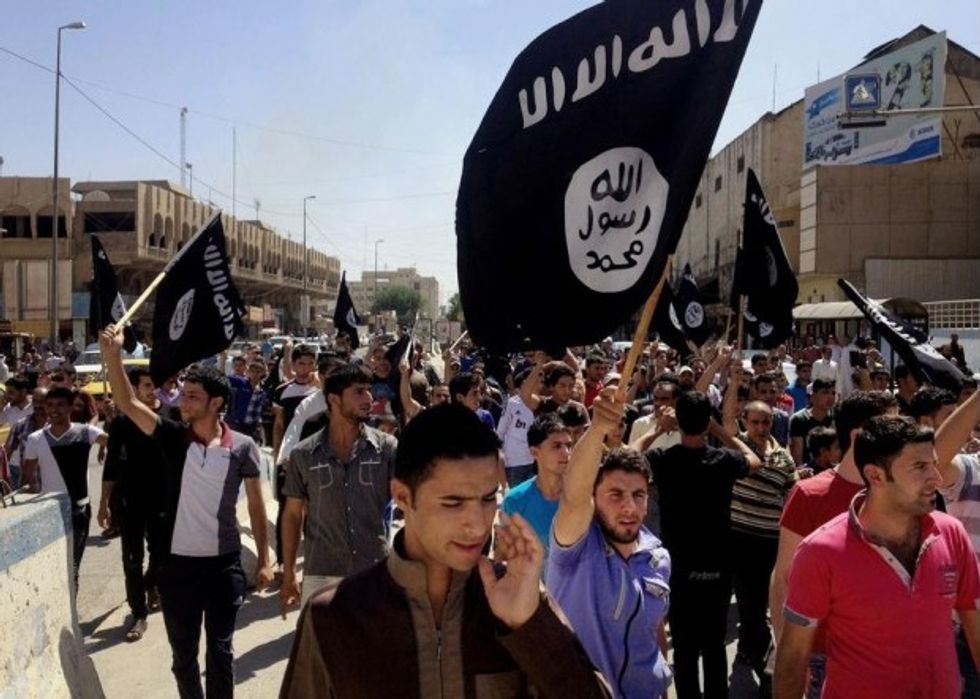
In this Monday, June 16, 2014 file photo, demonstrators chant pro-Islamic State group slogans as they wave the group's flags in front of the provincial government headquarters in Mosul, 225 miles northwest of Baghdad, Iraq. (AP Photo, File)

BEIRUT (AP) -- The Islamic State militants struck before dawn, staging house-to-house raids in a cluster of villages nestled along the Khabur River in northeastern Syria. They abducted at least 70 Christians - many of them women and children - while thousands of others fled to safer areas.
The captives' fate was unclear Tuesday, a day after they were seized, and relatives said mobile phone service was cut off and land lines also were not going through, adding to the fear and uncertainty about their loved ones. Heavy fighting was reported in the area.

The Islamic State group has a history of killing captives, including foreign journalists, Syrian soldiers and Kurdish militiamen. Most recently, militants in Libya affiliated with the extremist group released a video showing the beheading of 21 Egyptian Christians.
The group's bloody campaign in Syria and Iraq, where it seeks to form a self-styled caliphate, has repeatedly targeted religious minorities since it took control of a third of both countries. The United States and coalition of regional partners are conducting a campaign of airstrikes against the group.
The militants struck near the town of Tal Tamr in Hassakeh province, an area predominated by Assyrian Christians. Most of the captives came from Tal Shamiram and some from Tal Hurmiz.
Nuri Kino, the head of a group called A Demand For Action, said between 70 and 100 Assyrians were taken captive. About 3,000 people fled and have sought refuge in the cities of Hassakeh and Qamishli, he said, adding that his activist group based its information on conversations with villagers who fled the attack and their relatives. His group focuses on religious minorities in the Middle East.
"Have they been slaughtered? Are they still alive? We're searching for any news," said an Assyrian Christian woman from Tal Shamiram who now lives in Beirut. The woman said she has been trying to find out what has become of her parents, her brother and his wife and their children, but couldn't reach anyone in the village.
"I feel so helpless, I cannot do anything for them but pray," she said, speaking on condition of anonymity for fear of endangering relatives believed to be held by the militants.
The Britain-based Syrian Observatory for Human Rights, which also reported the abductions, put the number of Christians held by the Islamic State group at 90. The Observatory relies on a network of activists inside Syria.
Both groups said that most of the captives come from Tal Shamiram, located some 85 kilometers (50 miles) southwest of the provincial capital of Qamishli, and nearby Tal Hurmiz. At least four civilians, including a 17-year-old, were killed in clashes later Monday, a relative of one of the victims said on condition of anonymity.
The extremists could use the Assyrian captives to try to arrange a prisoner swap with the Kurdish militias it is battling in northeastern Syria.
Last year, IS militants abducted more than 150 Kurdish boys and held them in a school in Aleppo province where they subjected them to daily instruction on militant ideology for five months before releasing them in batches. The group has also released Turkish truck drivers and diplomats after holding them for months. It was not known whether a prisoner deal was struck in those instances.
Hassakeh province is strategically important because it borders Turkey and areas controlled by IS in Iraq. Kurdish militiamen from the People's Protection Units, or YPG, backed by the coalition airstrikes, have made advances in the province in a new offensive launched this week.
Heavy fighting broke out in the province Monday as Kurdish fighters and IS militants battled for control of villages near the Iraqi and Turkish borders.
The Kurds have been one of the most effective foes of IS, a reputation they burnished in recent months by repelling an assault by the extremists on the town of Kobani on the Turkish border. The coalition carried out hundreds of airstrikes that helped the Kurds break the siege in January.
On Tuesday, heavy clashes between Kurdish fighters and IS militants raged near Tal Tamr.
The Assyrian woman in Beirut said that before Monday, clashes would occasionally break out near Tal Shamiram, but that IS militants were mostly on Mount Abdulaziz, some 25 kilometers to the south.
"My family visited me last month and returned to Syria. There were clashes, but it was normal, nothing exceptional," she said, her voice breaking with emotion.
The Islamic State group's online radio station, al-Bayan, said Tuesday that IS fighters had detained "tens of crusaders" - the term it frequently uses for Christians - and seized 10 villages around Tal Tamr after clashes with Kurdish militiamen.
It reported an intense movement of coalition planes over Hassakeh.
The U.S. Central Command said the coalition carried out 10 airstrikes near Hassakeh on Monday, striking at nine IS tactical units and destroying two of their vehicles.
The Assyrian Network for Human Rights in Syria said on its Facebook page that the militants had moved the captives to the village of Umm al-Masamir on Mount Abdulaziz, some 25 kilometers south of Tal Shamiram. That raised fears, the network said, that IS could use them as human shields against Kurdish militiamen.
Habib Afram, president of the Syriac League in Lebanon, said he was in contact with Assyrians in Hassakeh and expressed hope that the captives could be freed in some kind of swap, although he added that he didn't know of any formal talks.